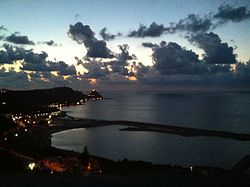
Capo di Ponte is an Italian comune in Val Camonica, province of Brescia, in Lombardy.

The province of Messina was a province in the autonomous island region of Sicily, Italy. Its capital was the city of Messina. It was replaced by the Metropolitan City of Messina.

Massa is a town and comune in Tuscany, central Italy, the administrative centre of the province of Massa and Carrara. It is located in the Frigido River Valley, near the Alpi Apuane, 5 km (3 mi) from the Tyrrhenian Sea.
Naso is a town and comune in northeastern Sicily, Italy, administratively part of the Metropolitan City of Messina. As of 2011, it had a population of 4,070.
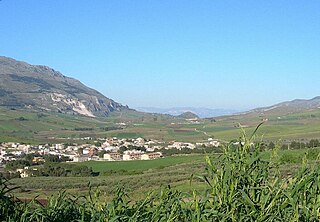
Buseto Palizzolo is a town and comune in North-Western Sicily, Italy, administratively part of the province of Trapani.

Alcara li Fusi is a comune (municipality) in the Metropolitan City of Messina in the Italian region Sicily, located about 120 kilometres (75 mi) east of Palermo and about 80 kilometres (50 mi) west of Messina.

Brolo is a comune (municipality) in the Metropolitan City of Messina in the Italian region Sicily, located about 130 kilometres (81 mi) east of Palermo and about 60 kilometres (37 mi) west of Messina.

Capri Leone is a comune (municipality) in the Metropolitan City of Messina in the southern Italian region Sicily, located about 120 kilometres (75 mi) east of Palermo and about 70 kilometres (43 mi) west of Messina. Capri Leone sits in the foothills of the Nebrodi Mountains. Capri Leone borders the following municipalities: Capo d'Orlando, Frazzanò, Mirto, San Marco d'Alunzio, Torrenova.
Ficarra is a comune (municipality) in the Metropolitan City of Messina in the Italian region Sicily, located about 130 kilometres (81 mi) east of Palermo and about 60 kilometres (37 mi) west of Messina, in the Monti Nebrodi. It is surrounded by woods of hazel and olive trees.

Mirto is a comune (municipality) in the Metropolitan City of Messina in the Italian region Sicily, located about 120 kilometres (75 mi) east of Palermo and about 70 kilometres (43 mi) west of Messina.
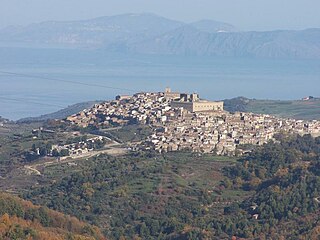
Montalbano Elicona is a comune (municipality) in the Metropolitan City of Messina in the Italian region Sicily, located about 150 kilometres (93 mi) east of Palermo and about 50 kilometres (31 mi) southwest of Messina on the Nebrodi mountains at the border with the Peloritani range. It is one of I Borghi più belli d'Italia.

San Fratello, formerly San Filadelfo, is a comune (municipality) in the Metropolitan City of Messina in the Italian region Sicily, located about 110 kilometres (68 mi) east of Palermo and about 90 kilometres (56 mi) west of Messina. San Fratello borders the following municipalities: Acquedolci, Alcara li Fusi, Caronia, Cesarò, Militello Rosmarino, Sant'Agata di Militello.
San Marco d'Alunzio is a city and comune (municipality) in the Metropolitan City of Messina in the Italian region Sicily, near the north coast of the island, located about 120 kilometres (75 mi) east of Palermo and about 80 kilometres (50 mi) west of Messina.
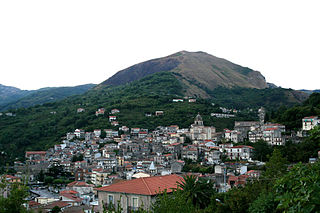
Tortorici is a comune (municipality) in the Metropolitan City of Messina in the Italian region Sicily, located about 130 kilometres (81 mi) east of Palermo and about 70 kilometres (43 mi) west of Messina.
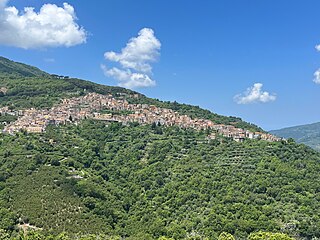
Ucria is a comune (municipality) in the Metropolitan City of Messina in the Italian region Sicily, located about 130 kilometres (81 mi) east of Palermo and about 60 kilometres (37 mi) west of Messina. It is part of the Parco dei Nebrodi.
Torrenova is a comune (municipality) in the Province of Messina in the Italian region Sicily, located about 130 kilometres (81 mi) east of Palermo and about 80 kilometres (50 mi) west of Messina. As of 31 December 2004, it had a population of 5,635 and an area of 13.0 square kilometres (5.0 sq mi).

Orlandina Basket, known as Infodrive Capo d'Orlando for sponsorship reasons, is an Italian professional basketball club that is based in Capo d'Orlando, Sicily. It plays in the second tier Serie A2 Basket.

The Metropolitan Area of Strait of Messina, is the urban agglomeration around the Strait of Messina, and is one of the most populated and important areas of Southern Italy. It includes part of the Province of Messina, in Sicily, and part of the Province of Reggio Calabria, in Calabria.

The Metropolitan City of Messina is a metropolitan city in Sicily, Italy. Its capital is the city of Messina. It replaced the province of Messina and comprises the city of Messina and 107 comuni. According to Eurostat in 2014, the FUA of the metropolitan area of Messina had 277,584 inhabitants.
The Basile family, Basili, Bassil, or de Basilio is an ancient family of the Sicilian nobility, invested with the Baronia del Grano in 1473.
